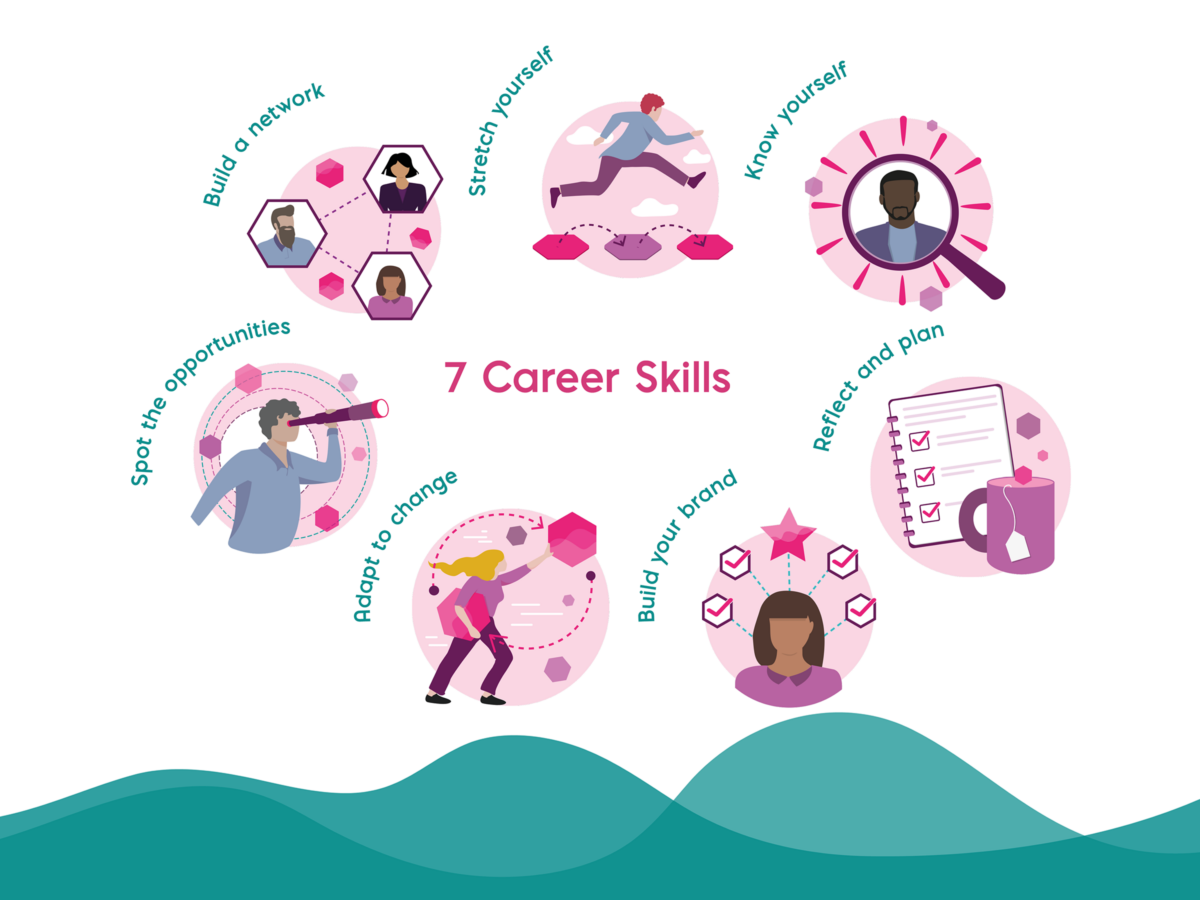How can we help people to navigate changeable careers and achieve growth and satisfaction? In this article we look at the 7 career skills that empower employees and develop organisational resilience.
The Career Innovation Company have identified seven evidence-based career skills that benefit both individual employees and your organisation as a whole, as you adapt to the dynamic world of modern careers.
Understanding the context
The organisational context of careers matters greatly; what’s happening in the business environment, the impact of technology, the need for reskilling, and the desire for equitable access to opportunities. Employee’s careers take place in this context, yet they are also personal, based on their changing situations, career aspirations and dreams.
But employees often don’t know how to get what they want in the ever-changing work environment. Often, they want predictable career paths and clear line of sight of their next opportunity. This expectation is hard to satisfy – and unrealistic – as organisations evolve and adapt.
Embracing the Chaos Theory of Careers
Many organisations want to offer more fluid career trajectories, where people can grow their skills through experiences, moving across teams or assignments to build career growth and satisfaction. Making this happen requires a shift in thinking about what’s possible – and pro-activity to connect individuals with opportunities.
The Chaos Theory of Careers1 provides a fresh way of approaching careers, it recognises that ‘strategic opportunism’ ‘adaptive action’ and making the most of ‘chance’ are the ingredients for navigating careers. But what does this look like in practice? This is where the 7 career skills come in.
The 7 career skills
The 7 career skills enable leaders and employees to see what attitudes and behaviours they can practice on a daily basis to make the most of the more fluid ‘opportunity marketplace’ of work. Think of them as some of the ingredients for success; for career satisfaction, career agility and career mobility.
The origin of the 7 career skills
The skills were born out of collaboration with Professor Paul Yost from Seattle Pacific University in 2011, when we created the Career pulse self-assessment tool. Over 20,000 people worldwide have since benefited from it. The skills are deeply rooted in organisational careers and describe the behaviours and attitudes that drive effective career development and, in turn, career satisfaction.
Research by Nathan Iverson (2016)2, analysed our career skills data from 2870 individuals across 40 countries. This showed that all 7 skills link to career satisfaction, but the top three are:
- Build your network
- Spot the opportunities
- Know yourself
The 7 career skills are an integral part of all our career development solutions.
Applying the 7 Career Skills
The good news is that every employee can take control of their careers and enhance career satisfaction by incorporating these skills into their professional lives. Here’s a detailed breakdown of each skill:
1. Know yourself
Understand your skillset, seek feedback and develop criteria to make effective career decisions.
- How confidently can you explain your work interests, motivations, and the value you add?
- Seeking feedback from others will help you build on your strengths and recognise how you are distinctive.
2. Stretch yourself
Take on challenging tasks and assignments that will lead to growth, underpinned by a growth mindset, curiosity and lifelong learning.
- How regularly do you step out of your comfort zone to acquire new experiences and skills?
- Consider taking on additional tasks in your current role, or exploring what else is available across your organisation
3. Adapt to change
The capacity to alter your approach and be agile to new demands in the work environment. It also links to resilience. An underlying principle is personal employability, having the skills and capabilities to find new opportunities whatever may happen.
- How confident are you that your skills will be relevant in the future, and that you can adapt to new situations?
- Work to develop a mindset that welcomes change as an opportunity to learn new skills and gain experience.
4. Spot the opportunities
Being able to identify and create work opportunities for yourself. Actively explore the opportunities that exist, keep up to date and see emerging needs. Make sure you’re in people’s minds at the right time to access opportunities, and recognise the role of planned ‘happenstance’ – how you influence the possibility of chance events.
- How good are you at creating work opportunities for yourself?
- Keep your ‘antennae’ attuned to what is happening in your organisation and your wider professional world.
5. Build your network
Establish and build relationships with others for social and professional support. The strength of your relationships – your career supporters – is one of the most important contributors to career satisfaction and success. A core focus is building relationships through conversations.
- How firmly do you have in place relationships that provide support, advice and encouragement?
- Make sure your network is strategic and aligned with your career aspirations.
6. Build your brand
Craft an active and visible reputation – everyone has a professional reputation that impacts on access to opportunities. Drawing on the marketing concept of brand, this encourages you to be clear about how you want others to see you and what you offer.
- How visibly does your (internal and external) reputation demonstrate your abilities, knowledge, career interests and experience?
- Everyone is unique, so think about the distinctive aspects of you and your career story and how you can communicate this.
7. Reflect and plan
Regularly stop to assess what is and isn’t working and prepare for the future. This is an important part of learning agility, learning from successes and challenges. Make time to prioritise development, identifying experiences you need to grow your career and personal reflection to set goals and take control.
- How regularly do you set aside time to reflect on what you’ve learned, and to plan your growth?
- Build in time to regularly review, reflect, and identify actions to achieve your long and short term goals.
“I’ve learnt that seeking guidance from mentors, networking with professionals in my desired field, and continuously learning and developing myself are all effective strategies for achieving my career goals”
Career pulse user
At The Career Innovation Company, we have a collective desire to impact positively on career opportunities for everyone in ways that support business agility and respond to the disrupted and changing career landscape. The 7 skills recognise that it’s often difficult for people and organisations to know what is the right action to take – and that lack of action can lead to inertia, low adaptability and attrition.
By putting the career skills into practice – and adapting behaviour – everyone can make change happen. Organisations that incorporate the skills into their career strategies can foster an increasingly dynamic and agile approach to careers.
1 Robert Pryor, Jim Bright (2011) The Chaos Theory of Careers: A New Perspective on Working in the Twenty-First Century
2 Nathan Iverson (2016) Career development practices: a global perspective NICEC Journal Issue 37





